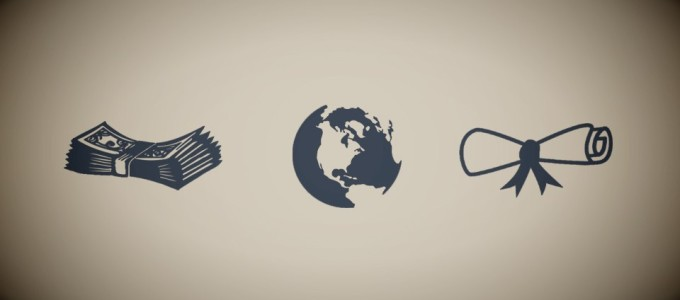Study and discussion questions to accompany your Come Follow Me reading for February 19-25
In addition to reading 2 Nephi 6-10 this week, you will enjoy watching the following related videos:
You would also enjoy reading the following chapters from the Book of Mormon Institute Student Manual:
If you would like a Kahoot game related to this material which you could use for personal study or use with your family or your class, click here: https://create.kahoot.it/share/2-nephi-6-10/bd922f75-2616-4529-b62c-373a4fb35854. To use it with a group, after clicking on this link, you will need to log into Kahoot, creating a free account if you have not done so previously, then click on the blue “Start” button. Some of the Kahoot questions may presuppose that the player has read through the suggested answers to the following Points to Ponder as well.
Points to Ponder in 2 Nephi 6-10
1. The Isaiah chapters are like a diamond mine—filled with lots of rocks and dirt, but with enough “diamonds” to make the search for the gems more than worthwhile. Mark at least one favorite passage in each of this week’s chapters from Isaiah and be prepared to explain why you selected it as a “diamond.”

2 Ne 7 ________________________________________________
2 Ne 8 ________________________________________________
2. Someone once said that he considered 2 Nephi 9 the greatest chapter in the Book of Mormon. Do you agree? Why or why not?
3. 2 Ne. 9:2 speaks of “lands” of promise. How many are there? Which is yours?
4. Why is death necessary to “fulfil the merciful plan of the great Creator”? (9:6.) Wouldn’t it be more merciful if we didn’t have to die?

5. What does the picture at the top of this post have to do with 2 Nephi 6-10?
6. What do you think it means that the devil “transformeth himself nigh unto an angel of light”? (9:9) What examples can you give?
7. Why would we necessarily have become devils without the atonement? Couldn’t we just be neutral? (9:9.)
8. Exactly what is meant by the term “spiritual death”? (9:12)
9. When Jacob says that after we’re resurrected, our knowledge will be perfect (9:13), does that mean teachers will be out of a job? Wouldn’t it be a little depressing to think that we had no more educational goals to strive toward? What does Jacob really mean?

10. If men are resurrected with either a celestial, terrestrial, or telestial body, as the scriptures and prophets have taught, what is the purpose of having the final judgment afterward? (9:15) Wouldn’t it make more sense to have the judgment first so as to make sure everyone got the right body in the resurrection? Or can you trade in a telestial body for a terrestrial one if at the judgment it is established that you haven’t been appropriately rewarded?
11. Does God really know every single little detail in the entire universe, past, present, and future? (9:20) How would you reassure someone who argued that the idea of God’s omniscience leads toward discouragement, since you know you can never pleasantly surprise God, and if you become inactive in the Church, God knew you would and so you couldn’t have done anything about it anyway?
12. Since Jesus knew everything (9:21), why didn’t he suffer just for those he knew would repent rather than suffer for the sins of everyone?
13. What does it mean that ‘the atonement satisfieth the demands of his justice upon all those who have not the law given to them”? (9:26) Hasn’t the law been given to everyone?
14. What interpretation do you personally give to Jacob’s denouncement of him who “wasteth the days of his probation”? (9:27) Just how busy does the Lord expect us to be? What is the dividing line between recreation and idleness?

15. Is it your personal experience that wealthy and educated people are less inclined to accept the gospel than the poor and ignorant? What examples can you cite on either side of this question? Would it be safer to avoid certain courses of study that might result in a loss of one’s faith? (9:28‑30)

16. How is it that those who die in their sins will see God’s face, when in 3 Nephi 12:8 it says it will be the pure in heart? (9:38)
17. What is the difference between the “wise” of 9:42 and those of 9:43?
18. Is judgment day really a glorious day? Why do so many seem to be afraid of it? (9:46)
19. Why do our leaders speak to us so much about chastity, pornography, the Word of Wisdom, tithing, etc., instead of focusing on happier topics such as faith, love, and the beauties of the celestial kingdom? (9:48)
20. How is it that 9:50 can say we can “buy wine and milk without money and without price” when we don’t drink wine? If it is a symbol for spiritual blessings, don’t we still have to pay our tithing and offerings to get them?

21. What do you think are the most frequent violations of the counsel given in 9:51? Wouldn’t it help if the Church leaders gave us a better list of what to avoid spending money or effort on?
22. Why was Jesus born among the Jews rather than among some other group? What passage gives at least one reason?
23. When 10:11 says “there shall be no kings upon the land” of the Americas, do you consider it a promise or a commandment? Have there, in fact, been kings in the Americas?

24. How can the American continent be considered an “isle of the sea? (10:20)
25. What other passages in these chapters did you particularly enjoy? Why?
Possible Answers to Points to Ponder in 2 Nephi 6-10
1. The Isaiah chapters are like a diamond mine—filled with lots of rocks and dirt, but with enough “diamonds” to make the search for the gems more than worthwhile. Mark at least one favorite passage in each of this week’s chapters from Isaiah and be prepared to explain why you selected it as a “diamond.”
My selections:
7:7—If I have the Lord’s help, I never need be confounded or ashamed.
7:10—Those who obey the Lord’s servants will not walk in darkness.
8:3—Zion will be like Eden, with joy, thanksgiving, and melody.
8:7—I should not be afraid of men.
8:9, 17, 24-25—Awake! Put on thy strength!
8:11—Wonderful promise for the future.
8:12-13—We should fear the Lord more than men.
2. Someone once said that he considered 2 Nephi 9 the greatest chapter in the Book of Mormon. Do you agree? Why or why not?
It is certainly one of my favorites, because of its clear and powerful teaching of the plan of salvation and its practical counsel for everyday living.
3. 2 Ne. 9:2 speaks of “lands” of promise. How many are there? What is yours?
“In an area conference held in Mexico City in 1972, Bruce R. McConkie said: ‘The place of gathering for the Mexican Saints is in Mexico; the place of gathering for the Guatemalan Saints is in Guatemala; the place of gathering for the Brazilian Saints is in Brazil; and so it goes throughout the length and breadth of the whole earth. … Every nation is the gathering place for its own people.’”
4. Why is death necessary to “fulfil the merciful plan of the great Creator”? (9:6.) Wouldn’t it be more merciful if we didn’t have to die?
I’m not sure we totally understand the reason, but it must have something to do with our learning to walk by faith and be submissive to the Lord’s will. It may also have something to do with our learning to love more those who leave us and mourn for their passing. And perhaps it has to do with our not being able to get a glorified, perfected body until we get rid of this one.
5. What does the picture at the top of this post have to do with 2 Nephi 6-10?
Just as the wolf is pretending to be a sheep, so does the devil transform himself nigh unto an angel of light.” (9:9)
6. What do you think it means that the devil “transformeth himself nigh unto an angel of light”? (9:9) What examples can you give?
Not only can Satan appear to look like an angel, which he actually doesn’t do very often, but he is an expert at making sin look enticing. Lust is made to appear as love. Indulgence in addictive substances is passed off as “freedom,” etc.
7. Why would we necessarily have become devils without the atonement? Couldn’t we just be neutral? (9:9.)
Without the atonement, we wouldn’t have merited the help of God, and without his help, we would be powerless to resist Satan and his efforts to make us like him.
8. Exactly what is meant by the term “spiritual death”? (9:12)
Separation from the presence (and Spirit) of God.
9. When Jacob says that after we’re resurrected, our knowledge will be perfect (9:13), does that mean teachers will be out of a job? Wouldn’t it be a little depressing to think that we had no more educational goals to strive toward? What does Jacob really mean?
Jacob is really talking about our memories of our deeds while on earth, not about complete omniscience, which will take us ages to acquire.
10. If men are resurrected with either a celestial, terrestrial, or telestial body, as the scriptures and prophets have taught, what is the purpose of having the final judgment afterward? (9:15) Wouldn’t it make more sense to have the judgment first so as to make sure everyone got the right body in the resurrection? Or can you trade in a telestial body for a terrestrial one if at the judgment it is established that you haven’t been appropriately rewarded?
It appears probable that the final judgment is much like a graduation ceremony, where we will be formally presented with our eternal reward, but which will not be much of a surprise to anyone.
11. Does God really know every single little detail in the entire universe, past, present, and future? (9:20) How would you reassure someone who argued that the idea of God’s omniscience leads toward discouragement, since you know you can never pleasantly surprise God, and if you become inactive in the Church, God knew you would and so you couldn’t have done anything about it anyway?
God is the one who says he knows everything, so it would seem a bit presumptuous for us to try to tell him He really doesn’t. We may not understand how He knows the future, but He has an excellent record of foretelling it, including knowing centuries ahead of time what Joseph Smith’s parents were going to name him and that Martin Harris would have a nagging wife who would cause him to lose 116 pages of manuscript. But God’s foreknowledge doesn’t cause our actions. If someone wants to try to pleasantly surprise the Lord, it can’t hurt him to try.
12. Since Jesus knew everything (9:21), why didn’t he suffer just for those He knew would repent rather than suffer for the sins of everyone?
It would appear that although unrepentant sinners must suffer for their sins, there is no reason to believe that such suffering constitutes “payment” for those sins. Even the eventual inheritance of the terrestrial or telestial glory presupposes a payment for past transgressions, that only Jesus had the power to make.
13. What does it mean that ‘the atonement satisfieth the demands of his justice upon all those who have not the law given to them”? (9:26) Hasn’t the law been given to everyone?
It probably means little children and others who have never heard the true gospel.
14. What interpretation do you personally give to Jacob’s denouncement of him who “wasteth the days of his probation”? (9:27) Just how busy does the Lord expect us to be? What is the dividing line between recreation and idleness?
Clearly the Lord expects us to spend some time in rest, as He himself did following the Creation. Jesus also took time to escape from the multitudes to rest and meditate. The Lord’s Church has long sponsored recreational activities. But recreation should not be an end in and of itself but a means to prepare us to be more effective in our work once we have been “re-created.” Much of humanity, including too many Church members, spend much time in watching TV and pursuing recreation to an extreme, when they would be happier spending more time in honorable work and service to others.
15. Is it your personal experience that wealthy and educated people are less inclined to accept the gospel than the poor and ignorant? What examples can you cite on either side of this question? Would it be safer to avoid certain courses of study that might result in a loss of one’s faith? (9:28‑30)
It is certainly my experience that the wealthy and educated are harder to interest in the gospel, though, ironically, once one embraces the gospel it tends to make him more prosperous and more studious. It is not necessary to avoid any field of study out of fear that it will destroy one’s faith, provided one devotes commensurate time to the study of the gospel.
16. How is it that those who die in their sins will see God’s face, when in 3 Nephi 12:8 it says it will be the pure in heart? (9:38)
The pure in heart can see God’s face prior to judgment day and will be entitled to behold him eternally thereafter, whereas the wicked will behold him only long enough to be judged, after which they will mercifully be allowed to retire from His presence.
17. What is the difference between the “wise” of 9:42 and those of 9:43?
The “wise” of verse 42 are the worldly wise—those who think they are wise but really are not. The wise of verse 43 are those who are truly wise, meaning they know what to do with the knowledge they have and are humble enough to realize God knows more than they do.
18. Is judgment day really a glorious day? Why do so many seem to be afraid of it? (9:46)
It will be glorious to the righteous and fearsome to the wicked. Those who are afraid of it are either admitting they aren’t as prepared as they ought to be or misunderstand the power of the atonement to make them clean in the sight of God.
19. Why do our leaders speak to us so much about chastity, pornography, the Word of Wisdom, tithing, etc., instead of focusing on happier topics such as faith, love, and the beauties of the celestial kingdom? (9:48)
Presumably for the same reasons Jacob spoke not so much “of holiness” as about “the consequences of sin.” We’ll never have the opportunity to enjoy the beauties of the celestial kingdom unless we learn to keep the basic commandments on which our leaders focus so much attention.
20. How is it that 9:50 can say we can “buy wine and milk without money and without price” when we don’t drink wine? If it is a symbol for spiritual blessings, don’t we have to pay our tithing and offerings to get them?
Of course, the expression “wine and milk” is a symbol for the spiritual blessings of the gospel, which are available to the poor as well as the rich. Those who truly have nothing, including no income, have to pay nothing for those blessings. Those who do have an income are expected to pay tithes and offerings, though it is not that the money paid “buys” the blessings but that the willing heart qualifies one for the Lord’s free gift.
21. What do you think are the most frequent violations of the counsel given in 9:51? Wouldn’t it help if the Church leaders gave us a better list of what to avoid spending money or effort on?
Most of the luxuries people buy would fall into this category, as would many of the free time activities people engage in. We need not expect that Church leaders will infringe on our agency and our right to receive personal inspiration by giving us a lengthy list of things to avoid, but each of us is entitled to approach the Lord in prayer and feel for ourselves what we should do with the time and money at our disposal.
22. Why was Jesus born among the Jews rather than among some other group? What passage gives at least one reason?
10:4 indicates that no other nation would have crucified their God. And since Jesus had to be killed to complete the atonement, that is at least one reason he was born among the Jews.
23. When 10:11 says “there shall be no kings upon the land” of the Americas, do you consider it a promise or a commandment? Have there, in fact, been kings in the Americas?
Perhaps it is partly both. I used to think it was a promise but have come to regard it more as a commandment. There have been few kings who have reigned for long in the Americas, but there have been some, and there have been other dictators who for all intents and purposes functioned as “kings.”
24. How can the American continent be considered an “isle of the sea? (10:20)
Evidently since Lehi’s party had to cross the ocean to get here, and since they landed in a narrow part of the continent, it seemed to them as though it were an “isle.”
25. What other passages in these chapters did you particularly enjoy? Why?
Your choice. In addition to those already referenced in the questions, I particularly enjoy:
- 6:2: A reminder that a king or governmental leader is primarily a protector, not a provider.
- 6:13 The people of the Lord are those who wait for Him.
- 9:18 fulness of joy forever!
- 9:52 Let your hearts rejoice.
- 10:23 You are free to act for yourselves.
- 10:24 It is only in and through the grace of God that ye are saved.
